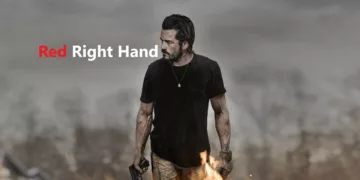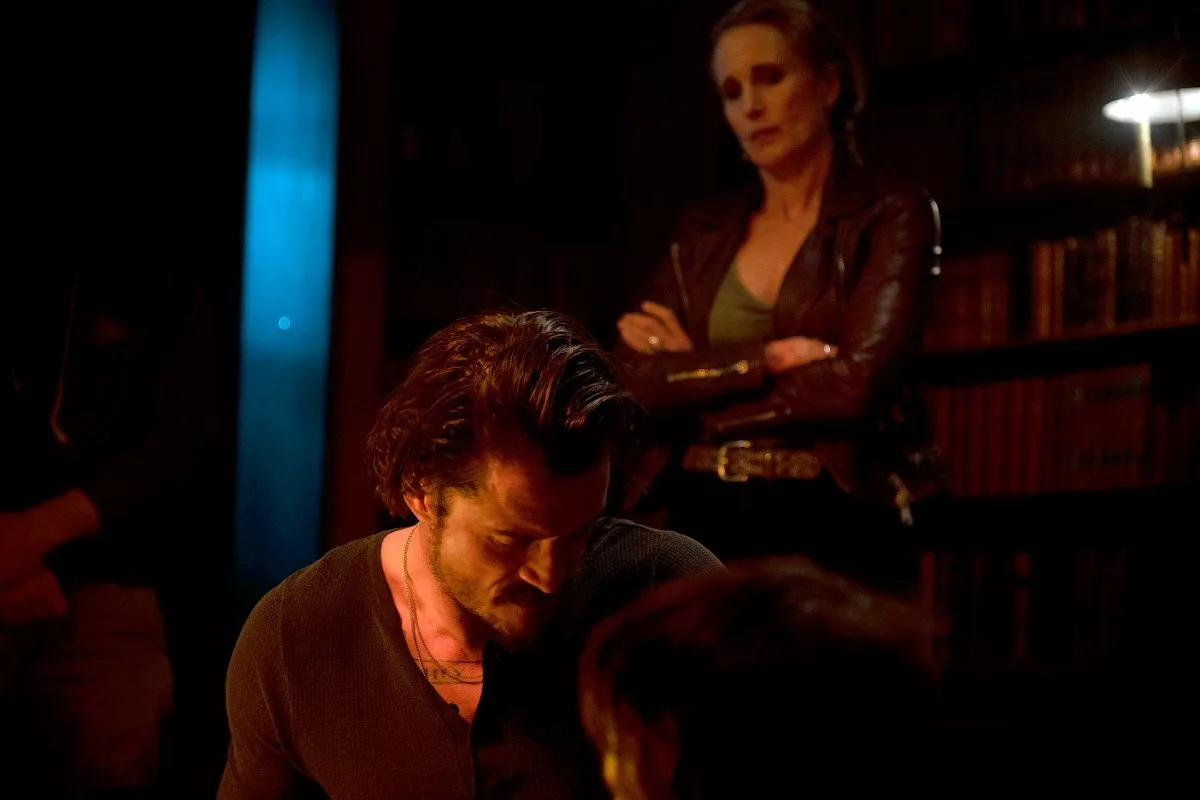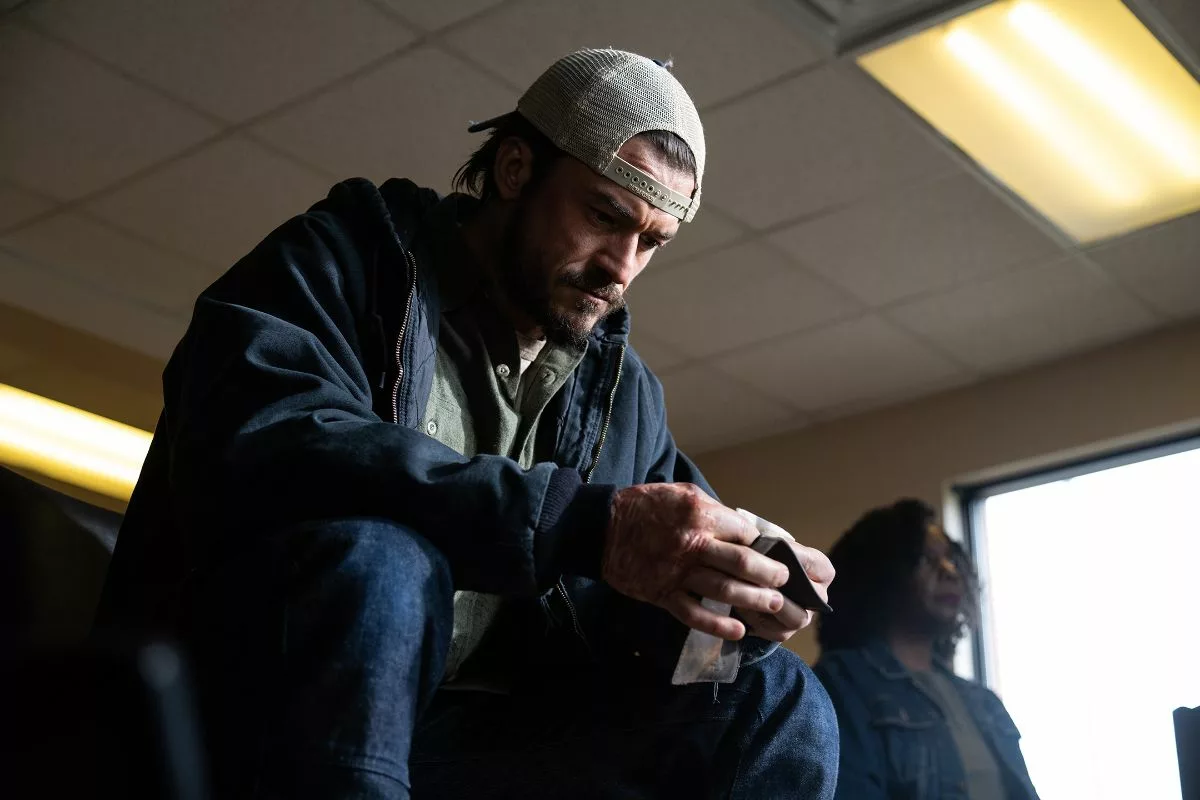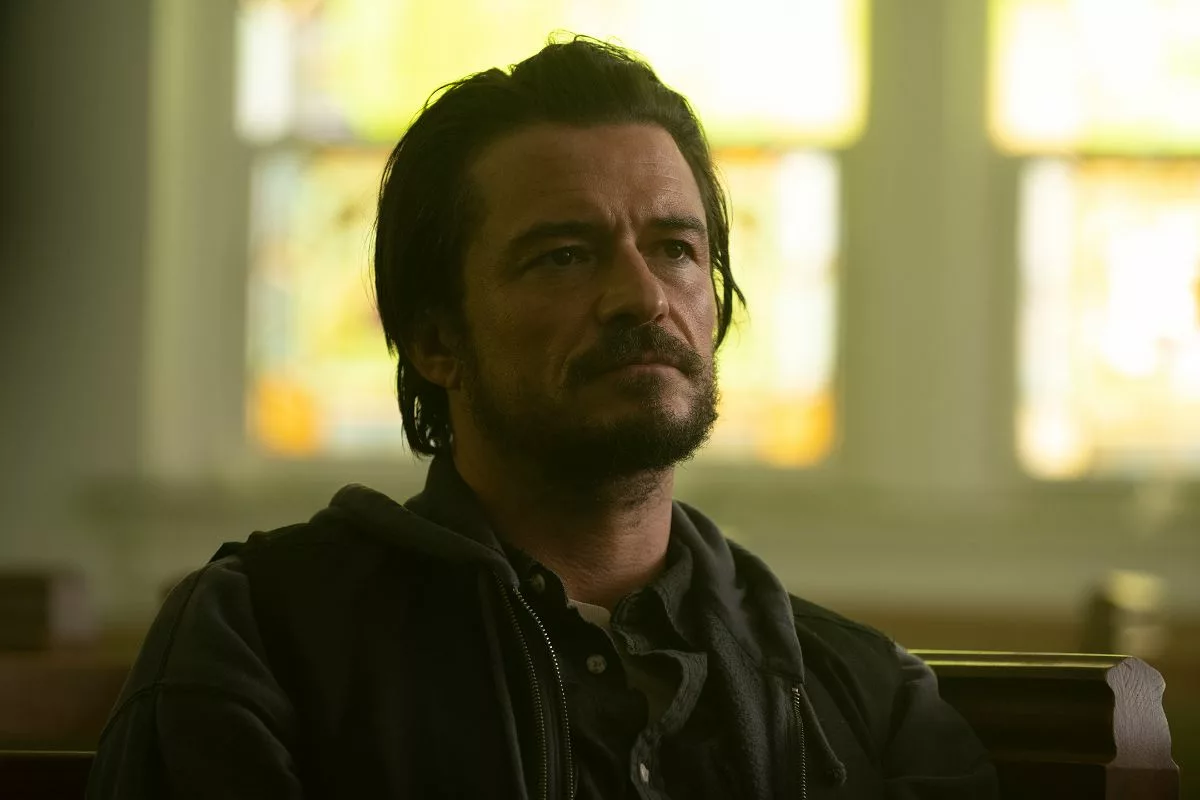Flanked by the lush forests and rolling hills of Appalachia, Red Right Hand kicks off a grim tale about ex-outlaw Cash (Orlando Bloom), who now spends his days caring for his grieving family and their struggling farm. When ruthless crime lord Big Cat (Andie MacDowell) forces Cash back into her felonious fold, he finds himself torn between keeping his loved ones safe and reverting to his violent ways.
As this brooding crime-thriller revs its engines, co-directors Ian and Eshom Nelms (who previously explored similar gritty terrain in Small Town Crime) steer a steady course toward directors like Taylor Sheridan, clearly taking cues from frontier sagas like Yellowstone. Leaning on the talents of Bloom and MacDowell to anchor their morally muddied leads, the Nelms brothers cultivate a tense atmosphere where Trust Is Rare and vengeance simmers.
While not reinventing the wheel, Red Right Hand shifts gears into some unexpectedly dark corners, testing its characters’ limits for the sake of family and survival. Buckle up for a bumpy backroads ride through guilt, grief and questionable choices, helmed by two directors intent on peering past the bloody surface.
Keeping It In the Family: How Far Would You Go?
When we first meet Cash, he seems to have left his dangerous past behind. Now focused on caring for his niece Savannah and drunkard brother-in-law Finney, Cash keeps his head down on their struggling farm, avoiding trouble at all costs.
But this fragile peace soon shatters when Finney falls behind on a loan payment to the merciless Big Cat, the crime queen who rules their rural Kentucky community with an iron fist. Her drug empire builds wealth for her mansion on the hill while the good folk of Odim County live in fear of her wrath. Big Cat runs things her way, unafraid to punish those who cross her with gruesome violence.
As both Cash’s former boss and a longtime local menace, Big Cat knows she has leverage to pull Cash back into her crooked web. She forces him into a deal: Cash does three grim jobs for her gang, she’ll forgive his family’s debt. Begrudgingly accepting, Cash sees no other choice if he wants to protect his niece Savannah, who’s already grown up faster than she should have after her mom’s fatal overdose.
What plays out is a tense thriller examining how far someone will crawl through the muck to shield their loved ones. Can morality and compassion survive getting blood on your hands? As Cash descends back into violence, he struggles to justify his actions while keeping Savannah from harm, not realizing he’s endangering her more with each job.
Anchoring this strained family drama are some exceptional performances, especially from Bloom’s conflicted Cash and steely crime boss Big Cat courtesy of MacDowell. The directors craft a brooding atmosphere throughout, where financial desperation and soul-rending grief leave the townspeople clinging to faith…even as death comes stalking.
Capturing the Backwoods: Gritty Visuals Reflect Inner Turmoil
Guiding us through Odim County’s tense terrain, co-directors Ian and Eshom Nelms cement their command of the rural crime thriller. After previously exploring similar gritty motifs in Small Town Crime, the Nelms brothers steer Red Right Hand with a steady hand and grim vision.
Shot on location in the woods of Alabama, cinematographer Johnny Derango lenses some striking visuals that immerse us in the natural beauty and economic despair of the Appalachians. Gliding through lush green undergrowth and weathered abandoned buildings, Derango’s camerawork evokes the contradictory souls who dwell here—as desperate as they are resolute.
During one picturesque scene, Cash bonds with his niece Savannah while helping a struggling mare birth her foal. Spotlit by shafts of light in an open barn, guarded by verdant forests, Derango poignantly captures the hopeful innocence Savannah still radiates…and that Cash aims to fiercely protect from Big Cat’s corruption.
Later, when Cash goes to confront the villainous Big Cat on her grand hilltop estate, Derango’s chilly palette and the hollow gleam of her red-lit parlor suggests a devil presiding over a circle of Hell. Throughout, the visual language echoes the choices faced by the characters, balancing beauty and brutality much as Cash struggles to justify his own soul-rending actions.
While not flashy, these organic visuals further root us in Cash’s world between righteous morality and ruthless survival. Paired with the setting, Derango’s cinematography emulates those battling their inner demons in a unforgiving land where only the strong carry on.
Delving into Darkness: Compelling Performances Anchor the Chaos
Anchoring Red Right Hand’s tense theatricality are some compelling performances that elevate the gritty genre fare. While the plot hits plenty of familiar beats, the conviction of the cast keeps us invested in the strained family’s plight.
In one of his most rugged roles to date, a bulked-up Orlando Bloom sheds his elven luminosity to fully inhabit Cash’s brooding intensity as an ex-con protective to the bone. Usually more of a dashing hero, Bloom embraces Cash’s darker edges, his voice a low rumble warning of coiled violence. Expertly balancing toughness and trauma, Bloom sells Cash’s desperate quest to shelter his family, conveyed through anxious eyes and tense muscles. If anything, Bloom’s committed performance only occasionally trips over Cash’s Alabama accent.
Facing off against Bloom is Andie MacDowell, clearly relishing the chance to play Big Cat’s brazen villainy to the hilt. Purring every honey-laced threat in an authentic Southern lilt, MacDowell blends menace and theatrical camp to keep us guessing just how far Big Cat will go. One minute she’s politely offering someone tea, the next she’s feeding a man to her dogs. MacDowell seems to savor Big Cat’s unpredictable volatility.
Providing backup are rock-steady turns from Scott Haze as the melancholy but stubborn Finney and newcomer Chapel Oaks as his quietly fierce daughter Savannah. Rounding things out, Garret Dillahunt goes satisfyingly big as the eccentric town pastor, giving fire-and-brimstone speeches with a wild look in his eyes.
Together, these actors overcome the familiar narrative, injecting some satisfyingly bold performances into this brooding rural noir. They sell the notion that protecting family requires a willingness to compromise your soul.
Keeping the Pace While Playing in the Gray
As Red Right Hand navigates the tense territory between protecting family and compromising morality, directors Ian and Eshom Nelms capably juggle playing in the grey against the urgent forward momentum.
Spanning over 100 minutes, the film maintains a steady, slow-burn progression atypical of its gritty genre. The Nelms brothers take care establishing the precarious dynamics of Cash’s household and Big Cat’s ruthless reach before gradually turning the screws through haunting shootouts and vicious attacks. Violent interludes arise organically rather than barrage nonstop action, better serving the complex themes explored.
That said, abrupt tonal shifts do clang occasionally, especially MacDowell’s wildcard performance as Big Cat. At times bordering on camp, her gleeful sadism clashes with the pervasive atmosphere of gloomy desperation. However, these tonal mismatches could be interpreted as heightening the chaotic unpredictability plaguing the strained community.
Overall, the directors thoughtfully modulate the pace, allowing relationships and thematic questions time to breathe while avoiding dragging. Quieter conversations further develop Cash’s inner conflict, keeping viewers invested in his torturous decisions to compromise morality as threats mount against his family. The film’s gritty momentum balances its aspirations of nuance.
Finding Humanity in the Brutality
At its best, Red Right Hand transcends expectations by grounding its gritty crime narrative in haunting questions about family, morality and karma. While not shying away from chilling violence between drug deals gone bad and vicious vengeance, the Nelms brothers cultivate genuinely affecting relationships between Cash, his loved ones and even his enemies.
In particular, Bloom and MacDowell deliver two of their most potent performances, lending charismatic gravity to characters seduced by opposing sides of human nature – compassion versus cruelty. Their scenes bristle with tense theatricality, their convictions clashing like two lions fighting for dominance.
Regrettably though, the film’s resolution provides more of a curt coda rather than profound catharsis after following Cash into literal and ethical darkness. His redemptive arc doesn’t entirely convince, undercutting some of the moral quandaries so deeply felt before the abrupt finale.
Additionally, while supporting players like Scott Haze and Chapel Oaks offer admirable performances, a few narrowly conceived caricatures like the eccentric town pastor distract rather than deepen the drama.
Yet despite familiar genre trappings and a hurried conclusion, the Nelms brothers mostly succeed at crafting a brooding rural noir true to itself rather than conventions. Elevated by Bloom and MacDowell striking chord after chord, Red Right Hand lingers like Bonnie and Clyde if it ended through the hazy lens of Terrence Malick. The actors seize the richest moments where love cuts through the violence – and save their people in the process.
Signing Off With Purpose
Through the low valleys and crimson sunsets of Red Right Hand, Cash fights against karma to protect his people, confronted by the man he used to be versus the guardian he must become. While not shattering new ground for its genre, the film bears poignant questions on how violence shifts the soul – especially when family drives the blows.
Anchored by Bloom’s rugged lead showing new depths and MacDowell clearly relishing her vicious crime queen, Red Right Hand overcomes familiar story beats through two commanding performances. For those seeking knotty drama brought to life by committed actors, the film holds satisfying rewards even if the conclusion wraps things up too directly.
Still, by the end credits, the directors steer Cash on a redemptive road toward resolution, if not outright redemption. Did he lose himself for the right reasons or merely replace one ruthless path for another? The answers remain tangled, speaking to the difficult diagonal between protecting others and your own moral code.
While not as subversive as early Coen Brothers noir or Jeff Nichols’ backwoods tragedies, Red Right Hand filters its grit through characters caught in the jaws of a merciless land they call home – yet still worth fighting for. In the end, Bloom leaves the hills still standing for those he loves, a little more peace in his red right hand. For audiences seeking bold performances wrapped in bruising questions of family and fate, this down-and-dirty drama holds rewards worth the ride.
The Review
Red Right Hand
Red Right Hand brings the grit without losing sight of the humanity struggling to survive. Thanks to Bloom and MacDowell sinking their teeth into morally slippery roles, the Nelms brothers steer familiar backroads territory toward some darker corners worth examining. Is the quest for redemption worth the collateral damage? The answers elude simple clarity - and the journey harbors enough to recommend for those who can stomach the brutality.
PROS
- Strong lead performances from Orlando Bloom and Andie MacDowell
- Brooding atmosphere and gritty cinematography capture the rural setting
- Thought-provoking themes about morality and protecting family
- Steady pacing allows relationships and drama to develop
CONS
- Familiar crime thriller story beats feel derivative at times
- Some distracting tonal shifts from overly theatrical performances
- The ending wraps up abruptly rather than providing catharsis
- Supporting characters lean more toward caricature





















































